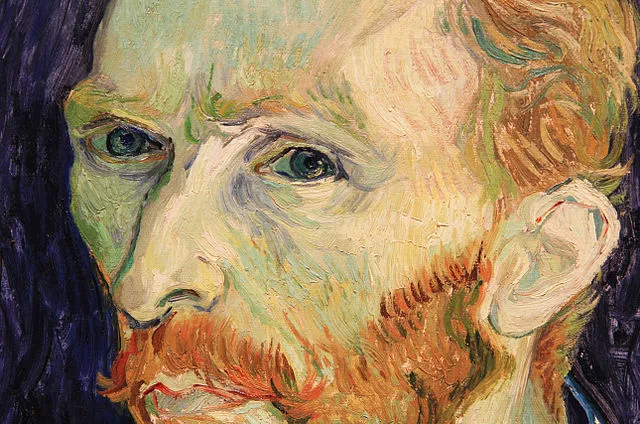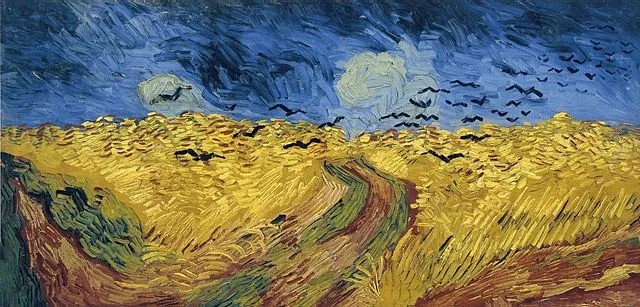El 29 de julio de 1890 fallecía Vincent van Gogh, el artista holandés que influyó decididamente en el desarrollo de la pintura moderna y contemporánea. Se me ocurrió inventar una especie de carta (apócrifa, por supuesto) dirigida a su hermano Theo, como las que escribiera a lo largo de su vida, en un momento de reflexión terminal.
On July 29, 1890, Vincent van Gogh, the Dutch artist who had a decisive influence on the development of modern and contemporary painting, died. It occurred to me to invent a kind of letter (apocryphal, of course) addressed to his brother Theo, like those he wrote throughout his life, in a moment of terminal reflection.
Nota: Lo colocado en cursivas son citas literales de cartas de Van Gogh a su hermano | Note: The italics are literal quotations from Van Gogh's letters to his brother Theo.

Mi querido Theo, he estado pintando estos gratos paisajes de Auvers, como lo hiciera también en Arles, para reconfortarme luego de estas duras crisis que se me han presentado en los últimos tiempos. Gracias al Dr. Gachet, a su compañía y apoyo, he podido reponerme en gran medida.
¿A qué se debe este estado? Quizás a esa enfermedad contraída en mis tiempos de disipación parisina, londinense o de estas tierras más cercanas… Aún recuerdo a Sien, en el ejercicio del que dicen "el más antiguo de los oficios".
Disculpa las desviaciones; la mente a veces se escapa. Como te decía en una carta reciente, me relajaré, no sin reflexión, pero sin apesadumbrarme con el lamento de las cosas que hubieran podido ser.
Quizás mi trabajo me haya consumido, pero para eso me dediqué al arte, emulando a los maestros franceses y, especialmente, a los japoneses. También a los que fueron compañía en un tiempo, como el celoso Gaugin, a quien auguro mucha suerte.
Me contenta haber podido vender uno de mis más queridos cuadros, "El viñedo rojo", en esta segunda exposición en la que participo, de algún modo gracias a tus diligencias como marchand. ¡Qué hubiese sido de mi vida si no hubiese contado con tu fervor, más que amor, de hermano!
No sé qué quedará de mi obra, de la que algunos han denostado. Ha sido mi trabajo, a ti te consta, de años duros y dilatados; mi trabajo o mi sacrificio, en el que arriesgo mi vida y mi razón destruida a medias.
Espero saber de ti pronto, mi viejo, mi buen amigo.

My dear Theo, I have been painting these pleasant landscapes of Auvers, as I did also in Arles, to comfort myself after these hard crises that have been presented to me in recent times. Thanks to Dr. Gachet, his company and support, I have been able to recover to a great extent.
What is the reason for this state? Perhaps to that illness contracted in my times of dissipation in Paris, London or in these closer lands... I still remember Sien, in the exercise of what they say "the most ancient of trades".
Forgive the deviations; the mind sometimes escapes. As I said to you in a recent letter, I will relax, not without reflection, but without grieving with regret for things that might have been.
Perhaps my work has consumed me, but that is why I dedicated myself to art, emulating the French and, especially, the Japanese masters. Also those who were once company, like the zealous Gaugin, to whom I wish a lot of luck.
I am happy to have been able to sell one of my most beloved paintings, "The Red Vineyard", in this second exhibition in which I am participating, thanks in some way to your diligence as a marchand. What would have become of my life if I had not counted on your fervor, more than love, as a brother!
I do not know what will remain of my work, which some have denigrated. It has been my work, as you know, of hard and long years; my work or my sacrifice, in which I risk my life and my reason half destroyed.
I hope to hear from you soon, my old, my good friend.
Referencias | References:
Van Gogh, Vincent (1984). Cartas a Theo (8ª ed.). España: Barral Editores.
https://es.wikipedia.org/wiki/Vincent_van_Gogh
https://en.wikipedia.org/wiki/Vincent_van_Gogh
Gracias por su lectura. Thank you for reading.



